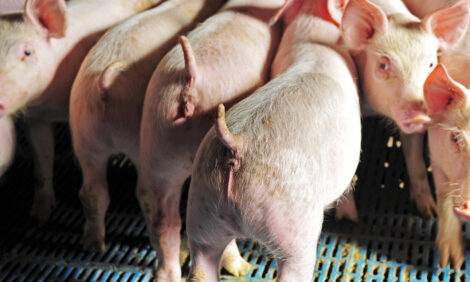



Weekly Overview: Significant Advance Made in Disease Control
ANALYSIS - Scientists in the UK have developed a new synthetic vaccine against Foot and Mouth Disease, which is being hailed as the start of a new era in vaccine development. It has been established that MRSA can be transferred from animals to humans and that, during epidemic periods, such as 2008, PMWS could cost the UK pig industry alone £88 million per year. A new report puts part of the blame for the rise in antibiotic resistance on the livestock sector.A new synthetic vaccine could signal a new era in vaccine development. This latest development is the result of collaborative research between Professor David Stuart, University of Oxford, and Dr Bryan Charleston, Head of Livestock Viral Diseases Programme at The Pirbright Institute.
They have developed an entirely synthetic foot-and-mouth disease vaccine that triggers response through minute protein shells.
According to its developers, this is 'the holy grail' of vaccines as it means that treatments can be developed without relying on the growth of live infectious virus. This will help reduce diseases spreading to disease-free areas and could also alter how viruses from the same family are fought, such as polio.
Although resistance in human infections is mainly caused by human antibiotic use, for a range of bacteria, farm animal use contributes significantly and for some infections is the main source of resistance, according to a new report from the Alliance to Save our Antibiotics.
The Alliance is an umbrella group of Compassion in World Farming, the Soil Association and Sustain and its latest 19-page report is entitled 'Antibiotic Resistance: The Impact of Livestock Farming on Human Health'.
A new study has shown that MRSA - methicillin-resistant Staphylococcus aureus - can be transmitted from animals to humans.
The study, entitled 'Whole genome sequencing identifies zoonotic transmission of MRSA isolates with the novel mecA homologue mecC', by researchers in the UK and Denmark, also shows the potential of whole genome sequencing in epidemiological investigations and source tracking of bacterial infections.
In the US, campaigning congresswoman, Louise Slaughter, has welcomed the research and has called on the US authorities to react by reducing the use of antibiotics in livestock.
Stark new figures show that a common pig virus - post-weaning multisystemic wasting syndrome (PMWS) - present on 99 per cent of pig farms has major economic implications for individual farmers and the pig industry as a whole, costing British farmers as much as £84 per pig (if the pig dies from the syndrome) and during epidemic periods, such as 2008, costing the UK pig industry £88 million per year.
And finally, the new edition of 'Hogs and Pigs' quarterly report on US pig output has been published.






